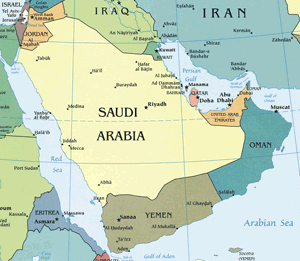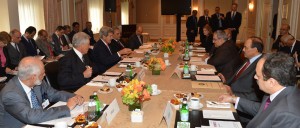Seldom is one able to gain insight into the foreign policy issues and objectives of any grouping of nations through the mind of one of its leaders. Even rarer is one introduced to the analyses and assessments of a leader of the Gulf Cooperation Council (GCC). [The GCC is comprised of Bahrain, Kuwait, Oman, Qatar, Saudi Arabia, and the United Arab Emirates.]
Such is the occasion in this instance. The National Council on U.S.-Arab Relations is privileged to publish an address by GCC Secretary General Dr. Abdul Latif Bin Rashid Al Zayani. On August 24, 2015, Dr. Al Zayani addressed a capacity audience at Queens’ College, University of Cambridge, convened for the Sixth Annual Gulf Research Meeting (GRM).

GCC Secretary General Dr. Abdul Latif Bin Rashid Al Zayani addresses the Sixth Annual Gulf Research Meeting in Cambridge, United Kingdom. Photo: Gulf Research Center.
Dr. Al Zayani’s remarks covered a broad range of topics. Principal among his focus were the implications for regional peace, security, and stability of the extraordinary trends and indications confronting the GCC in the past year. These included the domestic and international dynamics of violent extremism, Iran, Syria, and Yemen, together with other issues and challenges as well as opportunities.
Dr. Al Zayani, a native of Bahrain, is the fifth head of the Riyadh, Saudi Arabia-based GCC Secretariat General. He has held the post since December 2010. He holds a doctorate from the U.S. Naval Postgraduate School in Monterey, California.
Of particular significance is that this was the fifth time for Dr. Al Zayani to address this annual meeting. The hundreds (fewer than twenty of whom were Americans) that he briefed and met with represented no ordinary assemblage. They encompassed what, by any standard, is the foremost yearly gathering of Arabian Peninsula and Gulf specialists known to convene anywhere.
Included among the international scholars, academics, researchers, analysts, authors, consultants, and other foreign affairs practitioners was a growing number of young researchers from the GCC region, Yemen, and Iraq, who represent the emerging generation of those destined to lead and manage the region’s future. Each of the participants came together this year, as on every previous occasion, for three full days of meetings, discussions, and debates. In so doing, beyond examining the present and coming state of affairs with regard to a virtual smorgasbord of topics, they also proposed and recommended solutions to some of the most vexing geopolitical, cultural, socio-economic, and foreign relations issues of the contemporary era.
What entices all who engage in the GRM’s exceptionally well-selected and choreographed seminars is their abiding interests and involvement in a variety of issues anchored in Arabia and the Gulf. This is the exact same focus of the National Council on U.S.-Arab Relations’ recently concluded academic seminar for its Annual Washington, DC University Student Summer Internship Program in association with 22 sister organizations and the Elliott School of International Affairs at The George Washington University. 25 interns, out of an applicant pool of 125 candidates, participated in this summer’s program.
None of the GRM’s presenters and other participants needed reminding of the extraordinary impact that this region has had and continues to have upon all of humankind. Nor, despite this, are they unaware of how the region’s peoples, cultures, economies, governmental structures, foreign relations, and systems of political dynamics constitute for millions worldwide the most often misunderstood and unfairly maligned of any on earth. Enter the Gulf Research Center, the GRM’s host convener.
The GRC, founded by Saudi Arabian Dr. Abdulaziz Sager, organizes and administers these Annual Gulf Research Meetings in association with Cambridge University. (The National Council entered into a Cooperative Agreement with the GRC this past year). No stranger to Washington, DC, Dr. Sager has addressed several National Council Conferences and Capitol Hill Seminars for Members of Congress, Congressional staff, media representatives, members of the diplomatic corps, and the broader U.S., Arab, and other foreign policymaking communities.

Dr. Abdulaziz Sager, Chairman of the Gulf Research Center, welcomes participants to the Sixth Annual Gulf Research Meeting (GRM). Since the first GRM in 2010, over 1,200 papers have been presented in 86 workshops and scholars from 86 countries have participated in the event. Photo: Gulf Research Center.
The GRC has catapulted into one of the foremost of its kind in a very short period. Based in Jeddah, Saudi Arabia, with regional offices in Geneva, Switzerland, and Cambridge, United Kingdom, the GRC, in addition to its association with the National Council, has partnered with dozens of research and academic institutions in virtually every corner of the globe.
By special arrangement with Dr. Al Zayani, the National Council is privileged to share this edited version of his remarks to this year’s GRM.
Dr. John Duke Anthony
Founding President and CEO
National Council on U.S.-Arab Relations
Washington, DC
“Envisioning the GCC’s Future: Prisms for Perspective”
His Excellency Dr. Abdul Latif Bin Rashid Al Zayani, Secretary General of the Gulf Cooperation Council
Remarks to the Gulf Research Center’s Sixth Annual Gulf Research Meeting at the University of Cambridge, Cambridge, United Kingdom
August 24, 2015
Dr. Abdulaziz Sager, Mr. Chairman, Distinguished Guests, Ladies and Gentlemen,
Thank you once again for giving me the chance to return for the fifth occasion to this beautiful city to say a few words about some of our common concerns. In preparing for today, I looked back at my previous four talks. Reading them showed me clearly how the global and regional situation has worsened. Old tensions remain. New challenges abound. Two things struck me. The first was the optimism with which I spoke in 2012 about Yemen and my hopes for success of the GCC Initiative. The second was the pessimistic tone of my speech last year. I called then for a total realignment of thought to break the cycle of regional instability. In seeking solutions, my parting words were “do not be afraid to think what in the past would have been the unthinkable.”
Then and Now
So where are we today? Da’ish (Arabic for what many loosely refer to as the “Islamic State”) continues as the single greatest challenge for us all. Syria awaits, amid unabated devastation and bloodshed, a solution. The stubborn violence in Libya is ongoing. The so-called Middle East Peace Process is all but dead. Uncertainties over Iran’s destabilizing ambitions linger. Yemen is in the throes of a serious conflict. Our region continues to be the single worst breeding ground for extremism and harboring terrorism. At the same time, it has become the greatest importer of foreign fighters. Add to this the steep drop in oil prices, which has done nothing to enhance stability. Not a happy story, is it?
And yet in a strange sort of way, within all these dynamics, “the unthinkable has been thought!” There has been a clarification on certain issues. For instance, the initial stages of a final agreement on the Iran nuclear program, which is probably the best possible political solution for this thorny issue, has been signed. The unlikely alliances countering Da’ish are bonding more closely. The full impact of extremism is forcing the global community into a more cohesive counter stance. Lastly, the situation in Yemen is worse in terms of violence than it was last summer, but at least something is being done about it. It is these topics – the macro implications of the nuclear agreement, Da’ish and extremism, and the micro implications of the situation in Yemen – that we will consider.
Continue reading »










You must be logged in to post a comment.